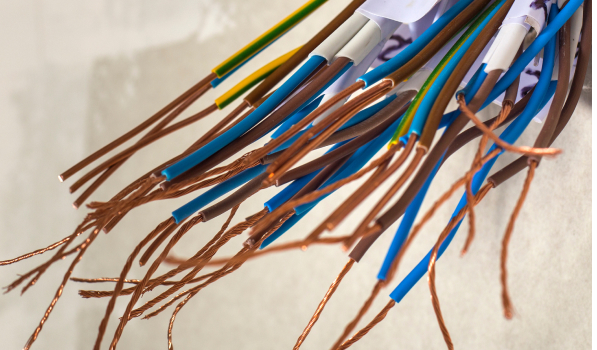You’ve probably heard about the issues about aluminum wiring. It’s not necessarily dangerous but it has some properties that leads to more problems. For example, it’s a better heat conductor and more cost-effective than copper, but that makes it a less suitable for electrical wiring especially in home electrical systems. Let’s break it down.
1. Aluminum damages easier than copper.
As we’ve established, aluminum is a better heat conductor than copper. “Better” isn’t always a good thing because this makes aluminum resistant to electricity which makes it heat up, oxidize, and gets damaged.
2. Not suitable for branch circuits
In North America during the mid-60’s, aluminum was the best choice because it was cheaper and softer than copper. However, when used in branch circuits with inadequate spacing in between (to prevent overheating between wires), it expands and shrinks because of the heat which causes loose wiring.
3. Prone to start fires
Since aluminum wires are more prone to overheating, one of the biggest dangers it brings is house fires. Some old panels, including the Zinsco panels, use aluminum was bus bars which is why they’re deemed dangerous.
This leads us to the question: how would I know if you have aluminum wiring?
- If your home was built around the mid-60’s and hasn’t been updated.
Aluminum wiring was a cheaper option during the 60’s. Homes built between 1965 and 1973 are more likely to have them. Some electrical panels also have them as bus bars. Look for labels or markings with “AL”, “ALUMINUM”, “AL-CU”, or “ALUMINUM 600V” in your circuit wiring. - Inspect your wiring
Be careful when doing this step! But if you have an option to inspect the wiring in your outlet and switches, if you see silver wires or anything labeled as “AL” or “ALUMINUM”. To double check you can also us a multimeter to test the conductivity of the wires. - Confirm with an expert
If you’re still unsure, best thing to do is to confirm with your electrician. They will provide you with more information and even a solution to what you want to do next.
If you’ve established that your house aluminum wiring, what to do?
- If rewiring is not an option, maintenance is key.
Electrical work can get costly but that’s okay! One thing you can do is to do all the necessary precautions to ensure that all your aluminum wiring won’t lead to a fire hazard. One option is to add copper wires at the connection to prevent overheating. It will be a tough process, and you might need an expert to help you with the steps but it’s the most basic thing you can do to ensure your home’s safety. - The Best Option: Rewiring.
We mostly recommend replacing the wires, especially if it’s all over your home’s system. This will come with a lot of stress and changes within your household so make sure to work within a timeline that works for you with your electrician.
By understanding how to identify aluminum wiring and why it matters, you can take the necessary steps to ensure your home’s electrical system is safe and reliable. Always prioritize safety and consult a professional electrician if you have any concerns about your home’s wiring.
